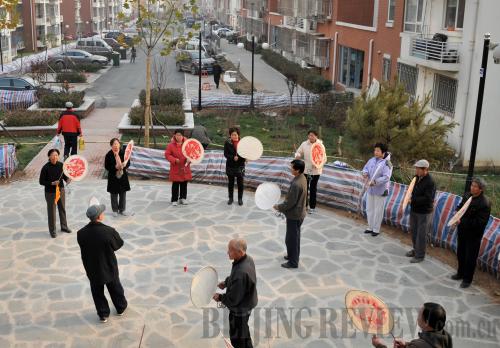|
 |
|
NEW LIFE: Residents in Shimenying Residential Community in Beijing's Mentougou District gather to play traditional music (LI XIN) |
At an executive meeting of the State Council, China's cabinet, on June 26, it was decided that more shantytowns on industrial, mining, forest and land reclamation sites across the country should be renovated within the next five years, and these plans are expected to benefit 10 million households.
In the next five years, Beijing is to invest 500 billion yuan ($81.49 billion) in renovating 527 shantytowns in downtown areas, according to the Beijing Municipal Committee of Housing and Urban-Rural Development. This is expected to benefit 700,000 residents in 230,000 households.
Renovation of about 90 of these shantytowns will start this year, said Ye Xiangzhong, an official with the Beijing Housing Guaranteeing Office.
Overcoming obstacles
Although shantytown renovation is a positive thing, the process is very complicated, Qi said. Renovation projects involve the relocation and compensation of shantytown residents. The process also tends to see disputes between real estate developers and local residents.
Some residents are reluctant to move because they do not want to be relocated to somewhere faraway or because they are not satisfied with the compensation. Some even demand additional benefits unrelated to housing.
Qi said that resident needs should be satisfied so long as they are reasonable. He also pledged that there will be continued efforts to keep the demolition process open and fair, and allow residents to learn about and participate in the entire process.
To prevent disputes, the Beijing Municipal Government stipulated that a renovation project will only be launched with the consent of at least 90 percent of involved residents.
Vice Mayor Chen Gang said that the city has produced uniform compensation standards and procedures. While the city will patiently explain policies and timely solve disputes, Chen said that for the small number of "nail households," those that refuse to relocate and ask for exorbitantly high compensation, the authority will expropriate their housing according to law.
Chen said that the city will try its best to settle residents in or near their previous communities, while those residents who must be relocated to other areas to reduce population density will be placed in areas with convenient rail transit systems as well as good education and medical facilities.
Another key issue facing renovation projects is funding. At the State Council executive meeting on June 26, the Central Government decided to increase financial support for shantytown renovation projects in the next five years, and local governments are required to meet the new standards. Financial institutions were called upon to provide more loans to such projects. Similarly, the government has encouraged private investment in shantytown renovation projects. Eligible companies are allowed to issue corporate debentures or medium-term notes for such projects. Companies that invest in government-initiated shantytown renovation can have the investment deducted from their taxable income.
In the next five years, a total of 500 billion ($82 billion) will be invested in renovating shantytowns in Beijing—including government investment, bank loans and funds raised from other sources, according to the Beijing Housing Guarantee Office. It also said that these projects will produce land available for commercial property development, and proceeds from selling such land will be used to finance shanty renovation.
With land in Beijing's center being such a scarce resource, it is getting more and more expensive. On September 4, a plot near Beijing's East Third Ring Road was sold for more than 73,000 yuan ($11,928) per square meter of the proposed construction during a land auction.
"The future property sale price is estimated at 150,000 yuan (24,510) per square meter," Zhang Dawei, Director of Centaline Property's research center, told Xinhua News Agency.
Shantytown renovation projects will eventually be financed primarily by land sales, said Beijing-based weekly business publication The Economic Observer, citing an anonymous investment and financing advisor of the Beijing Municipal Government.
Email us at: wanghairong@bjreview.com | 